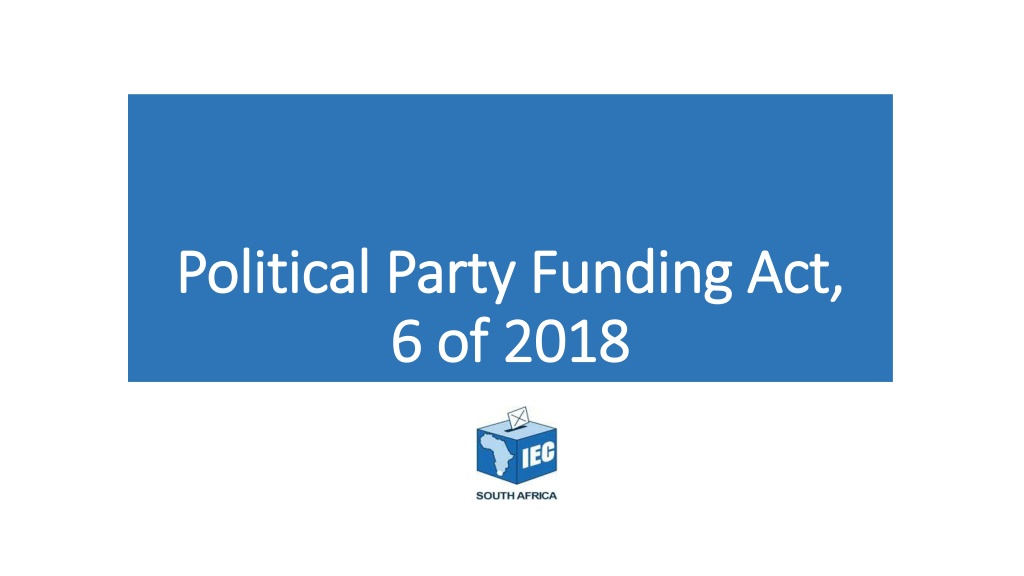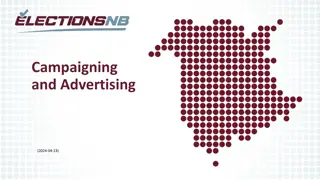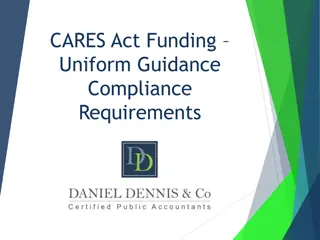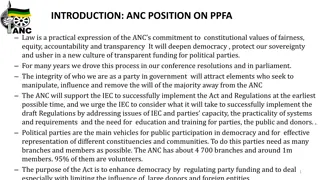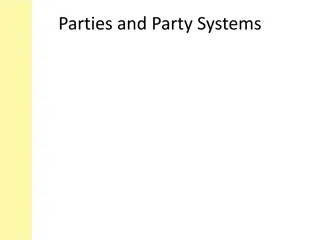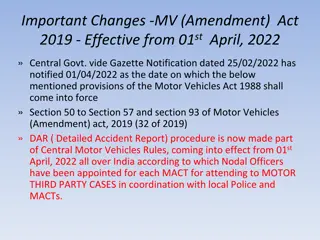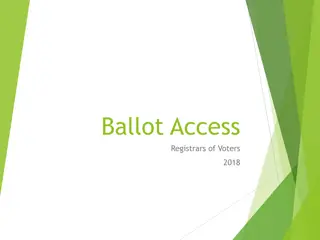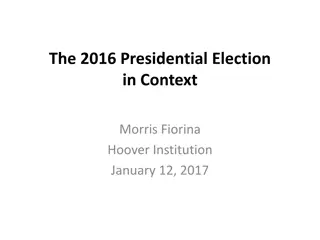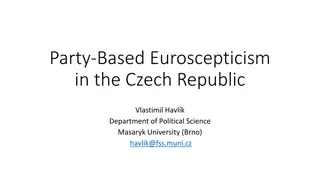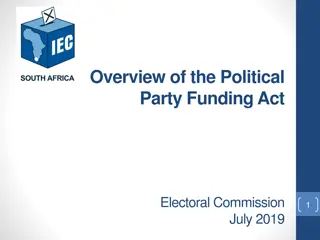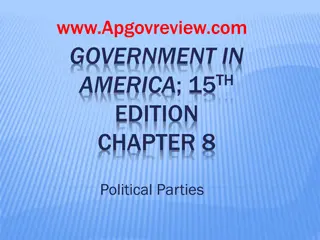Understanding Political Party Funding Act of 2018
The Political Party Funding Act of 2018 regulates the funding of political parties in South Africa, ensuring equitable and proportional funding for parties participating in national and provincial legislatures. The Act defines various terms such as donations, foreign persons, and political parties, aiming to enhance multi-party democracy. It establishes funds like the Multi-Party Democracy Fund and the Represented Political Party Fund, and sets out rules regarding donations in cash or kind. Enforcement provisions and duties of political parties are outlined within the legislative framework.
Uploaded on Sep 22, 2024 | 0 Views
Download Presentation

Please find below an Image/Link to download the presentation.
The content on the website is provided AS IS for your information and personal use only. It may not be sold, licensed, or shared on other websites without obtaining consent from the author. Download presentation by click this link. If you encounter any issues during the download, it is possible that the publisher has removed the file from their server.
E N D
Presentation Transcript
Political Party Funding Act, Political Party Funding Act, 6 of 2018 6 of 2018
Context Context Legislative framework Interpretation Funds Direct funding of political parties Duties of political parties Enforcement General provisions 2
Legislative Framework Legislative Framework Constitution of South Africa s236 of the Constitution To enhance multi-party democracy, national legislation must provide for the funding of political parties participating in national and provincial legislatures on equitable and proportional basis Political Party Funding Act, 2018 (Act No. 6 of 2019) Electoral Act, 1998 (Act No. 73 of 1998); 3
Chapter 1: Chapter 1:- - Interpretation Interpretation
Definitions (s1) Definitions (s1) 1. Donation a. b. does not include i. a membership fee of the political party or any levy imposed by the party on its elected representatives; or ii. any funds provided to the political party by the National Assembly and provincial legislatures respectively in terms of sections 57(2)(c) and 116(2)(c) of the Constitution; 2. Donation in kind a. includes i. any money lent to the political party other than on commercial terms; ii. any money paid on behalf of the political party for any expenses incurred directly or indirectly by that political party; iii. the provision of assets, services or facilities for the use or benefit of a political party other than on commercial terms; or iv. a sponsorship provided to the political party; but does not include services rendered personally by a volunteer; includes a donation in cash, in kind or both; but 5
Definitions (s1) Definitions (s1) 3. Foreign person a. means any person or entity other than a i. citizen or permanent resident of the Republic; ii. company registered in terms of the Companies Act, 2008 (Act No. 71 of 2008); or iii. trust registered in terms of the Trust Property Control Act, 1988 (Act No. 57 of 1988); 4. Funds a. means the Multi-Party Democracy Fund and the Represented Political Party Fund; 6
Definitions (s1) Definitions (s1) 5. Political party a. includes any entity that accepts donations principally to support or oppose any registered political party or its candidates, in an election as defined in section 1 of the Electoral Act, 1998 (Act No. 73 of 1998); E.g. Forum for Service Delivery has representation in the Rustenburg Local Council. However, is not considered a represented political party for the purposes of the Act. Equally, AgangSA which has no representation in ANY legislative body. 6. Represented Political party a. means a political party with representation in the national or provincial legislatures; - There are currently 15 represented political parties. 14 in the NA plus 1 in the KZN legislature. 7
Chapter 2: Chapter 2:- - Funds Funds
Establishment of the Funds (s2) Establishment of the Funds (s2) 1. Two Funds established in terms of the Act a. Represented Political Party Fund (RPPF) i. money appropriated by an Act of Parliament; ii. any money recovered; and iii. interest earned on money invested. b. Multi-Party Democracy Fund (MPDF) i. money received from any private source whether from inside or outside the Republic; ii. any money recovered; and iii. interest earned on money deposited or invested. c. The Commission may not accept money from any i. organ of state (e.g. Dept. of Home Affairs); ii. state owned enterprise (e.g. Eskom or Alexkor); or iii. foreign government (Govt. of Zimbabwe) or foreign government agency (e.g. Namibian Dev. Agency); iv. proceeds of crime. d. Any contributor may request the Commission not to disclose their identity or the amount of the contribution. e. The Commission may charge a fee to defray the cost of administering and managing this Fund. 9
Allocation and Payments to Represented Political Parties (s6) Allocation and Payments to Represented Political Parties (s6) 1. Allocate money from the Funds to a represented political party only. 2. Allocation from the Funds must be made in accordance with the prescribed formula. a. The formula be based on i. an equitable allocation (33%); and ii. a proportional allocation (67%). b. Formula based on the results of the election (NPE). 3. The Commission may not take into account any money carried forward when it determines the allocation of money to a represented political party. 4. Allocation to a represented political party ends when the party ceases to have representation, i.e. a seat 5. The Commission must pay the allocated amounts quarterly. 10
Calculation of Calculation of Allocations Allocations Equitable Allocation Equitable Allocation Proportional Allocation per NA or PL (Schedule 2 section 4(a)) Equitable Allocation per Parties in NA or PL (Schedule 2 section 4(b)) # of Parties in NA or PL) # of Seats in NA/PL Proportional of total NA 400 0,48 24 096 385,54 14 1 721 170,40 EC 63 0,08 3 795 180,72 6 632 530,12 FS 30 0,04 1 807 228,92 4 451 807,23 GP 73 0,09 4 397 590,36 6 732 931,73 KZN 80 0,10 4 819 277,11 8 602 409,64 LP 49 0,06 2 951 807,23 4 737 951,81 MP 30 0,04 1 807 228,92 4 451 807,23 NW 33 0,04 1 987 951,81 4 496 987,95 NC 30 0,04 1 807 228,92 4 451 807,23 WC Total 42 830 0,05 2 530 120,48 1 50 000 000,00 7 361 445,78 61 11
Calculation of Calculation of Allocations Allocations Proportional Allocation Proportional Allocation Allocation According to Schedule 2 Item 3 - Proportional Allocation # of Seats per party in the National Assembly or Provincial Legislature Proportional Allocation per NA or PL (Schedule 2 section 3) 843 373,49 240 963,86 58 433 734,94 602 409,64 120 481,93 240 963,86 20 843 373,49 11 325 301,20 361 445,78 3 373 493,98 120 481,93 361 445,78 120 481,93 481 927,71 2 530 120,48 Proportion of Representation out of 830 Total Seats per party Party 1ACDP 2AIC 3ANC 4ATM 5Al-Jamah 6COPE 7DA 8EFF 9GOOD 10IFP 11MF 12NFP 13PAC 14UDM 15VF+ Total NO. or seats per NA or PL Count of Parties per NA or PL NA EC FS GP KZN LP MP NW NC WC 4 2 1 1 1 7 2 0,01 0,00 0,58 0,01 0,00 0,00 0,21 0,11 0,00 0,03 0,00 0,00 0,00 0,00 0,03 230 44 1 19 37 44 1 38 22 21 18 12 1 485 2 1 2 5 1 2 84 44 2 14 10 5 6 4 20 11 11 8 3 7 3 4 4 6 8 3 24 2 1 173 94 3 1 13 1 1 28 1 3 1 4 21 2 1 2 2 1 10 1 3 1 1 2 1 1 400 63 30 73 80 49 30 33 30 42 830 1 100 000 000,00 12 14 6 4 6 8 4 4 4 4 7 61
Purposes for which money from Funds may be used (s7) Purposes for which money from Funds may be used (s7) 1. The money may be used by that represented political party for any purpose compatible with its functioning as a political party in a modern democracy including a. the development of the political will of the people; b. bringing the political party s influence to bear on the shaping of public opinion; c. inspiring and furthering political education; d. promoting active participation by individual citizens in political life; e. exercising an influence on political trends; f. ensuring continuous and vital links between the people and organs of state; and g. complying with the provisions of this Act. 13
Purposes for which money from Funds may not be used (s7) Purposes for which money from Funds may not be used (s7) 1. The money may not be used by that represented political party a. for the purpose of directly or indirectly paying any remuneration, fee, reward, perquisite or other benefit to any person i. representing the party in any legislature at national or provincial level, or in a Municipal Council (i.e. MP, MPL or Councillor); or ii. who is appointed by or in the service of the state (i.e. public servant) and receives remuneration for that appointment or service; b. to finance or contribute, whether directly or indirectly, to any matter, cause, event or occasion, in contravention of any code of ethics binding on the members of Parliament or members of a provincial legislature; 14
Purposes for which money from Funds may not be used (s7) Purposes for which money from Funds may not be used (s7) c. directly or indirectly for the purpose of establishing any business, or acquiring i. or maintaining any right of financial interest whatsoever in any business, or in ii. any immovable property, except where the right or interest in the immovable iii. property is to be used by the party solely for party political purposes; d. to defray legal costs relating to internal political party disputes; or e. for a purpose as may be prescribed. 15
Chapter 3: Chapter 3:- - Direct Funding of Political Parties Direct Funding of Political Parties
Prohibited donations (s8) Prohibited donations (s8) 1. Political parties may not accept a donation from any of the following sources: a. Foreign governments (e.g. Russia) or foreign government agencies (e.g. USAID); b. subject to subsection (4), foreign persons (e.g. Elon Musk) or entities (e.g. Amazon); c. organs of state (e.g. Dept. of Public Enterprises) ; or d. state-owned enterprises (e.g. Transnet or Alexkor). 2. A political party may not accept a donation from a person or entity, i.e. a single source, in excess R15m, within a financial year. 17
Prohibited donations (s8) Prohibited donations (s8) 3. A political party may not accept a donation that it knows or ought reasonably to have known, or suspected, originates from the proceeds of crime and must report that knowledge or suspicion to the Commission. 4. Nothing prevents a political party from accepting donations from foreign entities (e.g. Amazon) for the purpose of a. training or skills development of a member of a political party; or b. policy development by a political party. 5. The total donations is limited to R5 million, within a financial year. 18
Disclosure of donations to Political Party (s9) Disclosure of donations to Political Party (s9) 1. A political party must disclose to the Commission all donations received a. above R100 000; and b. in the form PPR4, and online. 2. A juristic person or entity (e.g. Company or Trust) that makes a donation above R100 000 must disclose that donation to the Commission on form PPR5 and online. 3. The Commission must publish the donations a. on a quarterly basis; and b. in the form PPR6 and online and Public website. 4. Nothing in this section detracts from rights given effect to by the Promotion of Access to Information Act, 2000 (Act No. 2 of 2000). NB: while the Act does not require disclosure by an individual. PAIA requires keeping record of ALL donations! 19
Recording Recording, preservation and disclosure of records on private funding of political , preservation and disclosure of records on private funding of political parties parties (s52A of PAIA, (s52A of PAIA, Act No. 2 of 2000 Act No. 2 of 2000) ) ( (1) The head of a political party must 1) The head of a political party must (a) (a) create create and keep records of and keep records of ( (i i) any donation exceeding ) any donation exceeding the R100 000 threshold the R100 000 threshold that has been made to that political party in any given financial year; and party in any given financial year; and (ii) the identity of the persons or entities who made such donations; (ii) the identity of the persons or entities who made such donations; (b) make the records available on a quarterly basis; and (b) make the records available on a quarterly basis; and ( (c) keep the records for a period of at least c) keep the records for a period of at least five years have been have been created . created . that has been made to that political five years after the records concerned after the records concerned 20
Prohibition on donation to member of political party (s10) Prohibition on donation to member of political party (s10) 1. No person or entity may deliver a donation to a member of a political party other than for party political purposes. 2. A member of a political party may only receive a donation on behalf of the party. 3. No person may circumvent any of the provisions of this Chapter. 21
Chapter 4: Chapter 4:- - Duties of Political Parties Duties of Political Parties
Political party to furnish information to Commission (s11) Political party to furnish information to Commission (s11) 1. In order for the Commission to monitor compliance, a political party must, furnish the Commission with any information and documentation that is required in terms of a direction issued under section 15. 23
Political party to account for income (s12) Political party to account for income (s12) Duties of Political Party Duties of Political Party 1. A political party must a. deposit all donations, i.e. from as little as R10, received by that political party, membership fees and levies imposed by the political party on its representatives into an account with a bank, in that political party s name (PPR3A); b. keep a separate account with a bank into which all money allocated to it from the Funds must be deposited (PPR3A); c. appoint an office-bearer or official of that political party as its accounting officer (PPR10); and d. appoint registered and practising an auditor, to audit its books and financial statements (PPR11). 24
Political party to account for income (s12 Political party to account for income (s12) ) - - Duties of Duties of Accounting Officer Accounting Officer 2. The accounting officer must a. account for all income received by the political party; b. ensure that i. any money allocated from the Funds is not paid out for a purpose not authorised by this Act; and ii. the political party complies with this Act; c. keep separate books and records of account, in respect of money allocated from the Funds and all transactions involving that money; and d. within the three (3) months i. prepare a statement showing all money received by the represented political party from the Funds during the previous financial year, the application of that money and the purposes for which the money has been applied; ii. prepare a statement showing all donations and membership fees, and any levy imposed by the political party on its elected representatives during that financial year; and iii. submit those statements and the books and records of account to an auditor appointed 25
Political party to account for income (s12) Political party to account for income (s12) Duties of the Auditor Duties of the Auditor 3. The auditor must perform an audit of the financial statements and express an opinion on those statements (PPR12) a. indicating whether the donations received by the political party comply with section 8(1); b. listing the donations above R100 000 (Annexure A); c. listing the donations under R100 000 (Annexure B); d. indicating whether any income was received by the political party other than provided for in terms of this Act (Annexure C) ; e. indicating whether the transactions in the financial statements related to the money allocated from the Funds are in accordance with this Act (Annexure E) ; and f. indicating whether any money lent to a political party is on commercial terms (Annexure D) . 26
Political party to account for income (s12) Political party to account for income (s12) (4) The accounting officer must submit the auditor s opinion and audited financial statements to the Commission within 6 months of the end of the Financial year, i.e. no later than September. (5) The Auditor-General may audit any represented political party s books, records of account and financial statements relating to money allocated to the party from the Represented Political Party Fund. 27
Unspent money at the end of financial year (s13) Unspent money at the end of financial year (s13) 1. Any money to a represented political party that is unspent at the end of the financial year must be shown as a credit balance carried forward to the next financial year in the a. bank account ; and b. books and records of account of the party. 2. If Parliament or a provincial legislature is dissolved or when the terms of these legislatures expire, a represented political party that fails to obtain a seat in any legislature in the next election must a. within 21 days after that election i. close its books and records in respect of those Funds; and ii. repay to the Commission the unspent balance of the money allocated to that political party; and b. within three months after that election submit an audited financial statement of the books and records to the Commission. 28
Chapter Chapter 5 5: :- - Enforcement Enforcement
Commissions monitoring and Inspection powers (s14) Commission s monitoring and Inspection powers (s14) 1. The Commission must monitor compliance by political parties. 2. In order to monitor compliance or investigate a complaint, the Commission may request any person a. to disclose any relevant information; b. to produce, any relevant books, records, reports and other documentation; c. for permission to i. enter any premises during ordinary working hours to inspect any relevant book, record, report and other document; or ii. copy or store in any format, any information, books, records, reports or other documentation produced in terms of paragraph (b) or discovered in terms of paragraph (c)(i); or d. to answer a question about any relevant information. 3. If any person refuses or fails to comply with a request the Commission may apply to the Electoral Court for an order to compel compliance with that subsection. 4. If a complaint relating to the income or expenditure of a political party is lodged with the Commission, it must, if the chief executive officer is of the view that there is prima facie substance to the complaint, investigate the complaint. 30
Commissions power to issue directions(s15) Commission s power to issue directions(s15) 1. The Commission may issue a direction to a political party in order to avoid imposing a sanction a. after affording that party an opportunity to make representations; and b. if it is of the opinion that the party fails to comply with this Act. 2. The direction must indicate which of the following sanctions that the Commission may impose if the political party fails to comply with that direction: a. Suspension of payment of allocated money; b. The recovery of money irregularly accepted or spent, this includes money where a donor is unknown or remains unidentified. Any such money must be forfeited to the MPDF; or c. The imposition of an administrative fine. 31
Power to suspend payment of money (s16) Power to suspend payment of money (s16) 1. The Commission a. may suspend the payment of money to a represented political party if it is satisfied on reasonable grounds that the represented political party has failed to comply with this Act; and b. must terminate the suspension if satisfied that the suspension is no longer justified in the light of the represented political party s subsequent conduct. 2. The Commission may only suspend payment if it has issued a direction under section 15. 32
Power to recover money irregularly accepted or spent (s17) Power to recover money irregularly accepted or spent (s17) 1. A political party is liable to pay to the Commission any money that is a. accepted in contravention of sections 8, 9(1) or 10; or b. spent in contravention of section 7. (2) The Commission must recover any money by (a) instituting a civil claim; or (b) setting off the liability against any amount to be allocated to a represented political party from the Funds. 3. Any money paid or recovered must be credited to the Funds. 4. A represented political party may not share in any allocation of the paid back or recovered money. 33
Administrative Fines (s18) Administrative Fines (s18) 1. The Commission may institute proceedings to request the imposition of an administrative fine in respect of any contravention of this Act. 2. The Electoral Court may impose an administrative fine in accordance with Schedule 1 in respect of a contravention or a repeated contravention of this Act 34
Offenses and Offenses and p penalities enalities (s19) (s19) 1. Any person commits an offence who contravenes a. sections 8, 9(1), 9(2) or 10; or b. sections 12(1), 12(2), 12(4) or 13(2). 2. Any person convicted of any offence referred to in a. subsection (1)(a), may be sentenced to a fine or to imprisonment for a period not exceeding 5 years or both; or b. subsection (1)(b), may be sentenced to a fine or to imprisonment for a period not exceeding two years or both. 35
Review Review or appeals or appeals (s20) (s20) 1. Any person may review or appeal any decision of the Commission made in terms of this Act. 2. The Electoral Court the exclusive jurisdiction to hear and determine any review or appeal against any decision of the Commission under this Act. 3. Section 20(2) of the Electoral Commission Act does not apply to reviews or appeals under this Act. 36
Chapter Chapter 6 6: :- - General Provisions General Provisions
Report Report to Parliament to Parliament (s22) (s22) 1. The Commission must for each financial year a. prepare a report in relation to the Funds, setting out i. the amounts received by and accrued to the Funds; ii. the allocations made from the Funds to the represented political parties; iii. the amounts spent by each represented political party in connection with the purpose under the prescribed categories; and iv. the balance in each of the Funds and any amounts owing to the Fund as at the end of that financial year; b. report on all donations made to political parties in that year; and c. submit the report and the Commission s books and records of account relating to the Funds to the Auditor-General for auditing. 2. The Auditor-General must audit and submit an audit report on the Commission s books and records in respect of the Funds to the Commission. 3. The Commission must submit its report and the Auditor-General s report together with the Commission s annual report in terms of section 14 of the Electoral Commission Act to the National Assembly. 38
Funding Funding of represented political parties by of represented political parties by legislatures (s23) legislatures (s23) 1. Parliament or a provincial legislature may not fund represented political parties other than through sections 57(2) and section 116(2) of the Constitution, section 34 of the Financial Management of Parliament and Provincial Legislatures Act, 2009 (Act No. 10 of 2009) and this Act. 2. The accounting officer of a legislature must annually disclose any funding of represented political parties to the Commission. 39
Funding Funding of represented political parties by of represented political parties by legislatures (s24) legislatures (s24) 1. The President, may make regulations in respect of matters contemplated in sections 6(2), 7(2)(e), 8(2), 8(5) and 9(1)(a). 2. The Commission may make regulations on any matter that may or must be prescribed by notice in the Gazette. 3. Before making any regulations the Commission must publish the proposed regulations for public comment. 4. A regulation in terms of this Act must be made by notice in the Gazette. 40
Repeal Repeal and transitional and transitional provisions (s25) provisions (s25) 1. The Public Funding of Represented Political Parties Act, 1997 (Act No. 103 of 1997), is hereby repealed. 2. Despite the repeal of the Public Funding of Represented Political Parties Act, 1997 (Act No. 103 of 1997), under subsection (1) a. anything done in terms of that Act which may be done under or in terms of this Act continues to be valid and of full force and effect; and b. the Represented Political Parties Fund established under that Act is deemed to be the fund established in terms of section 2(1). 3. The regulations made under the Public Funding of Represented Political Parties Act, 1997 (Act No. 103 of 1997), are amended by the substitution for those regulations of the regulations contained in Schedule 2. 4. Despite the definition of financial year in section 1, the first financial year of the Multi-Party Democracy Fund runs from the date on which this Act comes into operation until 31 March of the following year. 5. Despite section 9(3), the first disclosure in terms of paragraph (a) of that section must occur within 6 months from the date on which the Act comes into effect. 41
Questions and Discussions Questions and Discussions
